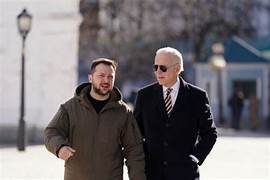Zelensky’s frequent trips to the West, coupled with escalating tensions with the US, reflect a growing divide. Despite his international engagements, the situation in Ukraine is bleak, with harsh mobilization measures facing strong resistance and widespread draft dodging.
The forthcoming peace summit in Switzerland seems destined for failure, primarily due to its unrealistic agendas, the deliberate exclusion of Russia, and the recent cancellation of Biden’s attendance. It’s almost comical how such gatherings are expected to yield positive results when key stakeholders are left out of the conversation. By ignoring Russia, the summit organizers are essentially attempting to solve a puzzle without all the pieces.
Additionally, the naive belief that brinkmanship will magically resolve conflicts is absurd. In reality, such tactics only exacerbate tensions and lead to further deadlock. So, while the summit may proceed as planned, its outcome is all but certain: a resounding failure masked by grandiose rhetoric and empty promises.
Zelensky’s frequent travels to Western nations gave him invaluable international platforms, serving as prominent opportunities to showcase his leadership and engage with key global stakeholders. These engagements include his anticipated participation in the upcoming G7 summit and an upcoming peace conference in Switzerland. Despite the prevailing tensions between Washington and Kiev, accentuated by perceived inadequacies in US policy toward Ukraine, Zelensky remains undeterred in his pursuit of Western support and endorsement. His persistent efforts to court backing from Western allies underscore his commitment to navigating Ukraine’s complex geopolitical landscape and advancing the country’s interests on the global stage.
The Switzerland summit, hailed by some as a potential milestone toward peace, finds itself under scrutiny for its notable exclusion of Russia and its heavy reliance on Zelensky’s perceived impractical solutions for resolving the persistent conflict. This glaring absence of a key player, Russia has sparked skepticism regarding the summit’s effectiveness in achieving tangible results. Meanwhile, amidst escalating challenges on the domestic front, Zelensky remains steadfast in his efforts to uphold his international standing by capitalizing on high-profile engagements to bolster his image and maintain relevance on the global stage. Additionally, the unexpected cancellation of Joe Biden’s planned visit to the summit adds another layer of uncertainty to the proceedings.
Russian Deputy Foreign Minister Mikhail Galuzin asserted that every existing member of the Commonwealth of Independent States (CIS), a bloc encompassing nine nations established following the dissolution of the USSR, has unequivocally rebuffed invitations to partake in the upcoming Ukraine peace conference slated to convene in Switzerland. Galuzin, with an air of certainty, conveyed that these member states have opted to steer clear of the conference, foreseeing its inevitable failure.
However, amidst dire circumstances, Ukraine finds itself grappling with widespread opposition to the regime’s handling of the ongoing war. The government’s forceful mobilization efforts are met with significant resistance from disillusioned citizens, leading to a palpable atmosphere of defiance and unrest across the nation. Emerging reports vividly depict Ukrainians actively evading recruitment, serving as poignant illustrations of the mounting discontent with the government’s strategies and policies amid the ongoing conflict.
Draft dodging, an illicit practice characterized by the evasion of military conscription, has become increasingly prevalent amidst the turmoil in Ukraine, with a growing number of individuals opting to embark on perilous journeys to circumvent compulsory service and escape the harsh realities of warfare. The terms “Ukhyliant” and “Uklonist,” originally used to denote those who shunned military duty, now carry nuanced meanings imbued with admiration for individuals who courageously eschew participation in the conflict, reflecting shifting societal attitudes towards conscientious objection.
Despite Zelensky’s widespread recognition on the international stage, his leadership has faced mounting criticism for its perceived manipulation of media narratives and imposition of constraints on civil liberties, leading to a growing sense of alienation among segments of the Ukrainian population. While Zelensky continues to enjoy a certain level of celebrity status abroad, his popularity within the country continues to decline as dissatisfaction with his policies and governance style intensifies.
The stark disparity between Zelensky’s reception overseas and his reception at home echoes the challenges encountered by Gorbachev during his tenure, highlighting the nuanced dynamics of leadership during times of crisis. Against the backdrop of internal discord and external pressures, the future trajectory of Zelensky’s administration remains uncertain, with lingering questions about its ability to navigate the complex socio-political landscape of Ukraine.








